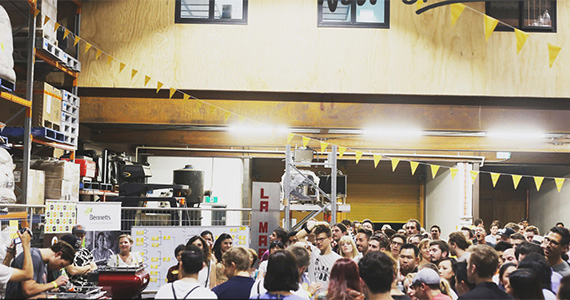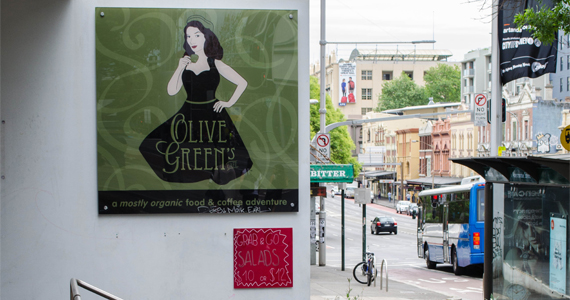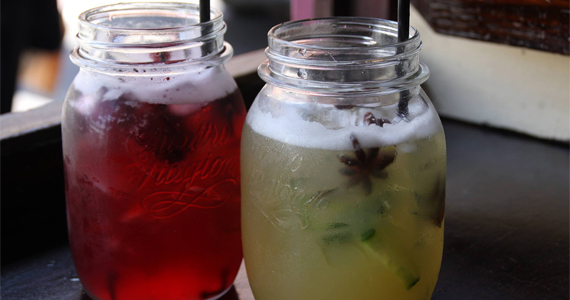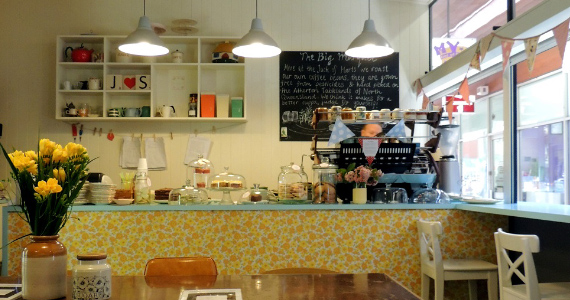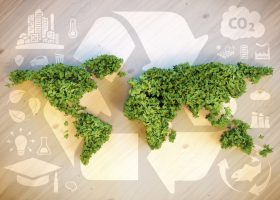
Got a sustainable food idea? Enter this competition from Electrolux
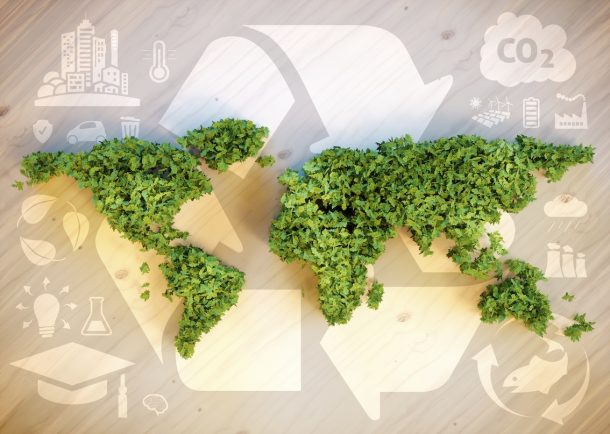
Got a sustainable food idea? Enter this competition from Electrolux
Author | Jon Dee
There’s a saying that we are what we eat. If you look at the state of the environment, then you’d have to conclude that we’re not doing as well as we might.
Every day, hundreds of millions of people go to bed hungry, yet the world is growing enough food to feed us all. Looking forward to 2050, it’s estimated that we’ll have another 2 billion people to feed. Food waste and CO2 emissions are growing while obesity and under-nutrition are becoming a bigger problem. These are all big problems, but as with all problems, there are always solutions.
So how do we make our food system more sustainable?
Fortunately, increasing numbers of people are interested in becoming more sustainable with where their food comes from and how they consume it. And healthy, sustainable eating has become part of our daily diet. That’s why Electrolux are looking for innovative ideas to inspire sustainable home cooking in a new global competition. The winner will receive a cash prize of €10,000 and a chance to transform their idea into reality.
You’ll also get a once-in-a-lifetime experience in Stockholm!
If you have a great idea to minimise food wastage or some tips to inspire sustainable home cooking, then why not enter the competition? To find out more and to enter, visit www.electroluxideaslab.com. For more information, you can also check out #DeliciousChange and #ElectroluxIdeasLab on Twitter. The closing date for entries is October 10th 2016.
It’s really positive when companies like Electrolux promote sustainable food solutions. Creating a more sustainable approach to our food system is in all of our interests.
Jon Dee, founder of FoodWise.com.au
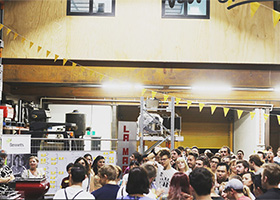
Solar-powered coffee hits Sydney
Solar-powered coffee hits Sydney
Author | Eliza Ridley
Surry Hills is renowned for its somewhat ‘trendy’ vibe, so it is not surprising that you would find Single Origin Roasters, a café trend setter by it’s own right, in the heart of Surry Hills.
Within the confines of this cosy little café, which has created a name for itself by delivering great coffee with a sustainable conscience, you’ll be able to consume one of Single Origins own ethically roasted blends of coffee and feast on delicious options from their seasonal menu.
Single Origin was founded in 2003 with a focus on creating fair trade, organic and sustainable coffee. Since then it has expanded its enterprise, not only sourcing high-grade coffee beans that are grown in a sustainable manner for café brewing, but also delivering single origin roasted beans to numerous environmentally-conscious cafes.
The roast
The coffee may be good, okay, great (this coming from a self-confessed tea-obsessed individual), but what really puts the cherry on top of their homemade muffins is the roasting method of their beans. Single Origin’s roasting plant in Botany is powered by solar panels. The roof of their Botany roast works is lined with 94 solar panels, which can be attested to generating enough power to offset Single Origin’s electricity usage between 7am and 2pm each day. This is considerably significant given 90% of roasting operations occur during this period
Their philosophy? If the sun is “putting out 5800 degrees Celsius worth of energy, it should be put to work”.
But does knowing the love going into the beans that make your coffee really matter? Well, perhaps it does considering Single Origins booming ‘Sideshow’ stall set up to satisfy the needs of takeaway customers without detracting from the vibe set up for dine-in patrons.
A new system?
And if that isn’t enough, Single Origin Roasters have now embarked on a new sustainability mission. Single Origin has recently adopted a milk dispensing system designed to more efficiently and more effectively distribute milk, reducing waste produced by their baristas.
Milk for this system arrives in 10 litre bladders rather than the usual 2 litre bottles you would buy at the supermarket. As a result, using bladders of milk uses 80% less plastic than the using bottles. Moreover, the bladders are flat when emptied, saving space when deposited in bins, unlike their bulky counterparts.
But Single Origin don’t just utilise this system at the expense of customer service. In fact, this system is two-pronged in the benefits it provides. The hands-free dosing method associated with the system effectively ensures that their baristas are spending less time opening, pouring from and crushing milk bottles and more time on what really matters: the coffee and the customers. This is particularly important for Single Origin takeaway coffee service as it minimises waiting time for customers.
Needless to say Single Origin Roasters truly love their coffee. Their passion for sustainable living is infused in their freshly roasted coffee to create the ultimate morning pick-me-up. Check out their café at:
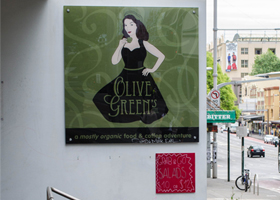
The conscious cafe inspiring students
The conscious cafe inspiring students
Author | Alex Tong
Sitting opposite UTS Broadway is one of Sydney’s most active players within the sustainable food space – Olive Green’s Café. This cosy welcoming café aims to promote food sustainability by serving a great variety of organic ingredients and reducing food wastage.
Olive Green’s Café offers a wide range of sustainable food choices in its menu. All staple foods (such as eggs and bread) are 99% organic, because the least a café can do to change the world is to use organic staples, says owner Myaa. You will never find heavily processed ingredients such as white rice or white sugar in your food, and Myaa opts for healthy alternatives wherever feasible (such as olive oil over butter). For those not fond of anything to do with animals, the café also offers healthy alternatives such as a vegan breakfast and lovely vegan birthday cakes.
For breakfast, the café gives customers the choice to pick the food and the amount they want, rather than the conventional way of serving everyone the same one plate. This reduces unnecessary leftovers as customers have the choice of choosing only the food they want to eat. Most ingredients (e.g. mushrooms) are cooked only when ordered, which means there is less food wastage at the end of the day and customers are served only the freshest of foods.
Olive Green’s Café also offers catering services with food sustainability in mind, by delivering only the exact amounts required and making sure beforehand there are no dietary concerns so that there wouldn’t be any leftovers. The café is very conscious about wastage, and makes sure even its own food scraps don’t simply go into the bin; it currently supplies the UTS: Institute for Sustainable Futures with coffee grounds, juice wastes, and other food wastes for use as plant compost.
The café’s sustainable food initiatives goes well beyond reducing food wastage. All coffee cups are completely compostable from lid to toe, and the coffee beans are organic and complies with fair-trade standards. This would surely explain why one of their most popular items is the yummy green tea latte! In the near future, Myaa is considering using alkalised water for cleaning to limit the use of harmful chemical cleaning agents, and using solar energy for a more sustainable future.
I would like to thank Myaa and the staff at Olive Green’s Cafe for giving their time to contribute to the Do Something! initiative.
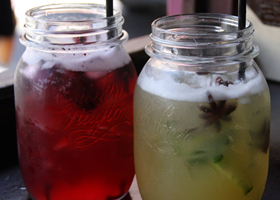
Newtown favourite sticks to its roots
Newtown favourite sticks to its roots
Author | Raymond Ramia
Raymond Ramia sat down for a chat with the owner of Newtown favourite, Vargabar, to talk all things sustainable food and why it’s worth it.
Owner and manager of Vargabar in the Inner-Sydney suburb of Newtown, Daniel Levitus, understands sustainability as an ‘umbrella’ term meaning there is little or no impact on the environment before and after the ingredients arrive at the restaurant. Staff preference for biodynamic and ethical foods meant that Vargabar was always going to have a sustainable approach from the very beginning. The result is good tasting food the way nature intended with less impact on the environment.
Daniel uses only seasonal produce in his restaurant café, with most of the ingredients sourced locally and organically where possible. Produce is sourced from local farmers in places like Byron Bay and Cowra NSW. Their coffee is sourced from ethical farmers, is rainforest alliance certified and comes from places like India , Mexico and Ethiopia.
Daniel utilises biodegradable materials to package his foods and recycled timber for all the menus. He recycles the cooking oil which is then picked up for biofuel and later converted into biodiesel. Coffee grounds are also recycling and given to gardeners for use as compost or mulch. Every year Daniel saves around 2000 kg of coffee grounds that would otherwise be sent to landfill.
Animal welfare has also always been an important consideration for the cafe, with Daniel supporting the ethical treatment of animals and stocking free-range, grass-fed and organic animal products.
In supporting farmers and sustainable produce, Vargabar hopes to raise awareness about bioethicalfoods without chemical or biological influences, whole foods and sustainable lifestyles in general. And plans for the future? Growing micro-herbs and installing solar power are just the tip of the iceberg.
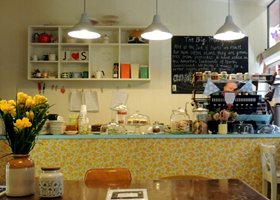
The Jack of Hearts and Jude: a café with a conscience
The Jack of Hearts and Jude: a cafe with a conscience
Author | Courtney Turner
For an establishment that seems to belong in the trendy streets of Melbourne, it’s hard to believe that The Jack of Hearts and Jude has made its way into the unassuming town of Engadine, but hey, we aren’t complaining.
Upon entering this quirky, family-run space, one may be forgiven for thinking that they had stepped back in time; quaint floral bunting, waist-clinched retro dresses and dainty tea-cups are all the rage. On the counter, a multitude of homemade cakes and biscuits tempt customers from a top their shiny glass stands. You might even go so far as to say that this little gem is the Wonderland of the café world!
Clearly caffeine, cakes and cute décor make for a very inviting place to spend the afternoon, but it isn’t just the relaxed vibe and friendly service that make this café so special. The Jack of Harts and Jude is also one of the only cafes in the area actively engaging in sustainable food practices.
Sourcing much of their produce locally, the ever-changing meals at The Jack of Harts are based on the best – and often most unusual – seasonal fruit and veggies available. Generous servings of delicious, free-range organic eggs dominate the menu, all of which are locally sourced from a family-run farm on the south coast of NSW. So, what motivated this tiny business to make the bold decision to source their produce locally?
Café owner Rhys said he is particularly conscious of supporting local farms and growers and always attempts to seek out the highest quality produce available. “We get our eggs from a farm in Gerringong. They’ve got about 80 rare breads of chickens that aren’t commercially profitable because they have to run around, exercise and might only lay every three days. But the eggs are just better, and you can tell. They cost a lot more money, but they just taste better.”

Arguably, the café’s most notable sustainable practice is their approach to coffee, which they source locally and roast in store. “I think the biggest thing that we’re doing is our coffee. We’ve completely gone against the grain and we buy all our coffee from Australian farms. And what we grow here is world class. It hasn’t travelled half way around the world to get here. It’s just come down from Byron Bay or Cairns and that’s how it should be. It grows, the farmers cure it, and we roast it and that’s it. There’s no middle man.”
Ethical and environment issues are also a concern for the friendly folk at the Jack of Harts, who are well-informed about what goes on behind the scenes of the billion-dollar Coffee industry. “People are importing beans from Africa or South America. They’re third world countries so the coffee’s cheap. It travels half way around the world to get here. Everything that comes into this country is methyl bromide fumigated and usually sterilized in a reaction chamber. You can’t get around that. It makes a mockery of selling organic coffee from Brazil or Ethiopia.”
After talking to Rhys over a pot of tea (from the Daintree, of course, with honey harvested by a local bee-keeper), it becomes obvious that the Jack of Hearts and Jude really is a café with a conscience. So the question remains, what does the future hold for the tiny café that packs a punch?
Well, if research, development and funding weren’t an issue, we would most likely be seeing a new and innovative coffee roaster in use at the Jack of Harts sometime in the near future. “In my head I’ve designed a coffee roaster, a commercial and industrial coffee roaster that runs on solar power and café scraps. It works, but I need to get it built. It costs money to do that sort of thing, and you need research and development.” Well, we’ll just have to keep our eyes peeled, but as for now, a pot of tea and a slice of cake will do just nicely.


